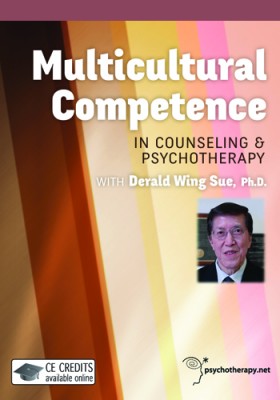 Multicultural Competence in Counseling & Psychotherapy delves into key aspects of multicultural counseling via an interview with Derald Wing Sue conducted by Victor Yalom. In just under an hour and a half, they explore the following topics: color-blindness, micro-aggressions, developing cultural competence, the race lab, the invisible white man, and the caterpillar and the ant. Each discussion offers viewers a candid analysis of these phenomena and their relevance to competent counseling practice.
Multicultural Competence in Counseling & Psychotherapy delves into key aspects of multicultural counseling via an interview with Derald Wing Sue conducted by Victor Yalom. In just under an hour and a half, they explore the following topics: color-blindness, micro-aggressions, developing cultural competence, the race lab, the invisible white man, and the caterpillar and the ant. Each discussion offers viewers a candid analysis of these phenomena and their relevance to competent counseling practice.
Throughout the existentially grounded interview, Sue validates personal and developmental challenges as part of the process of building cultural awareness, knowledge and skill. Sue consistently invites viewers to confront roadblocks to culturally competent practice such as taking a colorblind approach for fear of appearing racist, rigidly apply theories and techniques, experiencing implicit bias, or failing to anticipate our social impact on clients. He also offers practical suggestions for counselor educators, supervisors and trainees such as the use of recording, integration of experiential reality in training and supervision, creating validating and inviting office spaces, and striving for authenticity and reflexivity in practice.
In particular, Sue addresses concepts that inform counselor education and supervision practice through identification and discussion of both challenges and strategies in fostering cultural competence among counselor trainees. Thus, this video is ideally suited for doctoral students and could be used as part of the didactic curricula in courses focused on pedagogy, supervision, leadership and advocacy, or during doctoral fieldwork as students intern as instructors and supervisors. Likewise, the compelling combination of instructional content blended with Sue’s perspective and insights lends itself well to master’s-level counseling courses focused on multicultural counseling and advocacy or fieldwork. Sue’s expertise and personal disclosures have the potential to crystalize concepts for counselor trainees, normalize the challenges of developing cultural competence and inspire students to commit to a continual journey toward cultural competence.
Multicultural Competence in Counseling & Psychotherapy is well suited for classroom use or as an accompaniment to lessons or assigned readings for students engaged in distance learning. It should be noted that while the video can be viewed in one or two sittings, the concepts addressed are complex and may be more than students can digest in one or two sittings. It also should be noted that while the organization of chapter segments may be useful in selecting sections to include in class sessions or to accompany readings, some of the chapter divisions split related content. For example, Sue begins discussing the four major goals of training in the chapter on developing cultural competence and continues in the chapter on the race lab.
Yalom’s interview of Sue provides a platform to evoke Sue’s personal and professional experience as a pioneer in our field. Thus, as Sue addresses each phenomenon, he contextualizes it in a manner that supports a full understanding of its integral relevance to multicultural counseling and therapy. For example, Sue reflects on coming to a Eurocentric field with culturally bound theories and values that not only failed to account for cultural diversity, but also contributed to pathologizing it. The inclusion of his experience exemplifies the problem for viewers, sheds light on the courageous and vital work he and others have done, and underscores the charge to each of us to practice cultural competence and advocacy as counselors, educators and supervisors.
Reviewed by: Amie Manis, NCC, Capella University.
Psychotherapy.net (Producer), & Yalom, V. (Director). (2014). Multicultural Competence in Counseling & Psychotherapy with Derald Wing Sue [DVD]. (Available in DVD and video streaming from http://www.psychotherapy.net/video/multicultural-competence-psychotherapy-sue)
Available in DVD and streaming format as part of video subscription at Psychotherapy.net/subscriptions.
The Professional Counselor
https://tpcwordpress.azurewebsites.net
